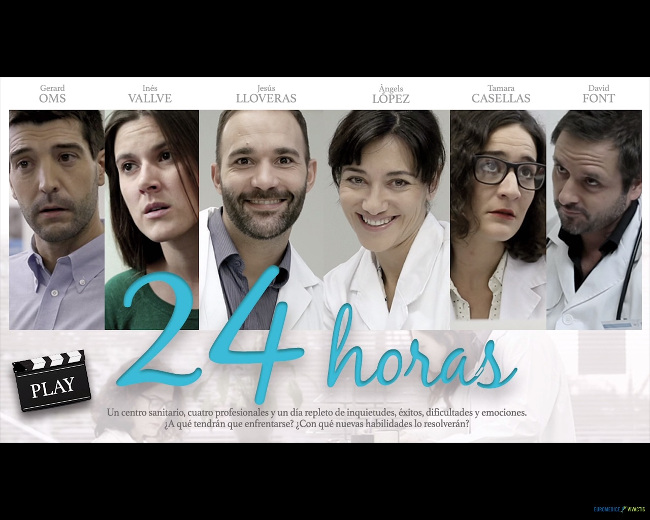28/02/2017
THE FIRST WEB TELEVISION SERIES ON DIABETES TO IMPROVE THE COMMUNICATION SKILLS OF HEALTH PROFESSIONALS IS BORN
This initiative, entitled "24 hours" and available on the Diabetes EON website, will include a total of 10 episodes issued on a monthly basis.
This platform will also include different modules with theoretical and practical contents where the major complications suffered by patients with diabetes will be addressed.

24 HORAS
Barcelona, 27 February 2017.- Diabetes EON (www.diabeteseon.com) has launched the first web television series on diabetes. Entitled "24 hours" and with a total of 10 episodes, its purpose is to improve the communication skills of health professionals involved in the care of diabetic patients. In addition, Diabetes EON also offers a number of modules where different microvascular and macrovascular complications that affect these patients and have a great impact on their quality of life are addressed.
Diabetes EON is yet another result of ESTEVE's commitment to chronicity -this time in collaboration with the Diabetes Study Group Network (RedGDPS Foundation), the Spanish Society of Family and Community Medicine (semFYC), and the Spanish Diabetes Federation (FEDE). Its purpose is to integrate the interaction of all professionals involved in tackling diabetes and thus ensure that prevention or earlier detection of diabetes-related complications, continuous follow-up and a better quality of life are provided to these patients.
This enabling program is meant to improve the most relevant relationship and communication skills of professionals in their daily tasks. The 10-episode "24 hours" web series shows the day-to-day life of different professionals in a health center. The author of both the contents and the scripts is Teresa Baró, an expert in personal communication skills. Each skill is approached with a three-step method: skill observation by viewing an episode, skill analysis by listening to an audio track, and skill readjustment by reading a document.
Physicians, patients, nurses and pharmacists participate in this project, as does a scientific committee formed by Dr. Josep Franch, from the Raval Sur (Barcelona) Primary Care team and a member of the RedGDPS Foundation board; Dr. Jorge Navarro, from the Clinical University Hospital of Valencia and a member of semFYC's Diabetes Group; Dr. Josep Massons, from the Mataró 7 (Barcelona) Primary Care team and a member of the communication and health Group of the Catalan Society of Family and Community Medicine (CAMfyc) and the semFYC; and Dr. Sara Artola, from the José Marvá (Madrid) Health Center and a member of the RedGDPS Foundation and the Spanish Diabetes Society (SED).
In the words of FEDE president Andoni Lorenzo, "this initiative not only helps visualize diabetes from another point of view and with new communication tools -a web series in this case-, it can also become a very useful instrument to improve communication and interaction between all the actors involved in the treatment of this disease".
Microvascular and macrovascular complications in diabetes
Diabetes EON also offers modules that specifically address the major complications suffered by diabetic patients. Although this disease is diagnosed primarily by means of glycemic values, its main impact lies on the appearance of microvascular and macrovascular complications favored by glycemic imbalances. These complications may have very serious consequences if going undetected and poorly controlled.
According to Dr. Josep Franch, from the Raval Sur (Barcelona) Primary Care team and a member of the RedGDPS Foundation, "while achieving surrogate endpoints such as risk factor control is important, the patient's point of view is essential because the ultimate goal of any intervention is to provide diabetic patients with the best possible quality of life. This is why their role is crucial in this program. These patients should be able to express their fears and their hopes, that is, freely express what they think so that joint work to achieve this goal can be carried out".
Each module will contextualize the complication, explain the importance of preventing and treating it, highlight the most relevant data, improve skills of communication with the patient, and put acquired knowledge into practice. Each module includes a conversation with the patient who has the complication (on video), illustrative computer graphics, advice on how to communicate with a patient who has that complication, practical exercises, and downloadable materials.
The modules on diabetic retinopathy, heart failure and diabetic nephropathy are already available, and other modules on ischemic heart disease, neuropathy and diabetic foot, peripheral arteriopathy and stroke will be added soon. All these modules will be completed with both theoretical training and in-person training in workshops.



